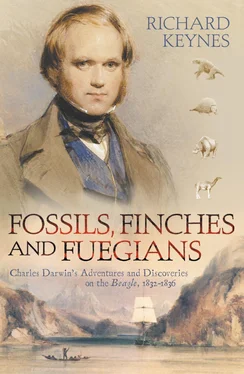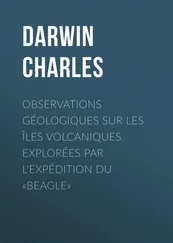1 ...6 7 8 10 11 12 ...22 My dear Henslow
Captain Fitz Roy is going out to survey the southern coast of Terra del Fuego, & afterwards to visit many of the South Sea Islands & to return by the Indian Archipelago: the vessel is fitted out expressly for scientific purposes, combined with the survey: it will furnish therefore a rare opportunity for a naturalist & it would be a great misfortune that it should be lost:
An offer has been made to me to recommend a proper person to go out as a naturalist with this expedition; he will be treated with every consideration; the Captain is a young man of very pleasing manners (a nephew of the Duke of Grafton), of great zeal in his profession & who is very highly spoken of; if Leonard Jenyns could go, what treasures he might bring home with him, as the ship would be placed at his disposal, whenever his enquiries made it necessary or desirable; in the absence of so accomplished a naturalist, is there any person whom you could strongly recommend: he must be such a person as would do credit to our recommendation.
Do think on this subject: it would be a serious loss to the cause of natural science, if this fine opportunity was lost.
The ship sails about the end of Sept r.
Poor Ramsay! * what a loss to us all & particularly to you.
Believe me / My dear Henslow / Most truly yours /
George Peacock
7 Suffolk Street / Pall Mall East
My dear Henslow
I wrote this letter on Saturday, but I was too late for the post. What a glorious opportunity this would be for forming collections for our museums: do write to me immediately & take care that the opportunity is not lost.
Believe me / My dear Henslow / Most truly yours /
Geo Peacock
7 Suffolk St. / Monday 41
As has already been seen, Leonard Jenyns was another clerical naturalist, brother-in-law of Henslow and vicar of Swaffham Bulbeck near Cambridge. After a day’s consideration of the offer, Jenyns decided regretfully that he could not leave his parish. Henslow therefore turned to Charles Darwin as the obvious alternative choice, and on 24 August wrote:
My dear Darwin, Before I enter upon the immediate business of this letter, let us condole together upon the loss of our inestimable friend poor Ramsay of whose death you have undoubtedly heard long before this. I will not now dwell upon this painful subject as I shall hope to see you shortly fully expecting that you will eagerly catch at the offer which is likely to be made you of a trip to Terra del Fuego & home by the East Indies. I have been asked by Peacock who will read & forward this to you from London to recommend him a naturalist as companion to Capt Fitzroy employed by Government to survey the S. extremity of America. I have stated that I consider you to be the best qualified person I know of who is likely to undertake such a situation. I state this not on the supposition of y rbeing a finished Naturalist, but as amply qualified for collecting, observing, & noting anything worthy to be noted in Natural History. Peacock has the appointment at his disposal & if he can not find a man willing to take the office, the opportunity will probably be lost. Capt. F wants a man (I understand) more as a companion than a mere collector & would not take any one however good a Naturalist who was not recommended to him likewise as a gentleman . Particulars of salary &c I know nothing. The Voyage is to last 2 y rs& if you take plenty of Books with you, any thing you please may be done – You will have ample opportunities at command – In short I suppose there never was a finer chance for a man of zeal & spirit. Capt. F is a young man. What I wish you to do is instantly to come to Town & consult with Peacock (at N o7 Suffolk Street Pall Mall East or else at the University Club) & learn further particulars. Don’t put on any modest doubts or fears about your disqualifications for I assure you I think you are the very man they are in search of – so conceive yourself to be tapped on the Shoulder by your Bum-Bailiff * & affect efriend /J.S. Henslow 42
This letter was reinforced in similar terms two days later by another from Peacock. Although both Peacock and Henslow said in their letters that FitzRoy was looking for a naturalist, it is evident that at some point in FitzRoy’s original conversation with Beaufort a geologist had been mentioned, for Henslow’s candidate for the post was described by FitzRoy himself as ‘Mr. Charles Darwin, grandson of Dr. Darwin the poet, a young man of promising ability, extremely fond of geology, and indeed all branches of natural history.’ 43 That FitzRoy thought he was primarily getting a geologist would be consistent with his gift to Charles on their departure from Plymouth of the first volume of Charles Lyell’s Principles of Geology . Moreover in his first report to the Royal Geographical Society on the Beagle ’s return to England in 1836 he said that ‘Mr Charles Darwin will make known the results of his five years’ voluntary seclusion and disinterested exertions in the cause of science. Geology has been his principal pursuit.’
CHAPTER 3
Preparations for the Voyage
Charles arrived back in Shrewsbury on Monday, 29 August from his trip in North Wales with Sedgwick, and was given Peacock’s and Henslow’s letters by his sisters. His immediate and joyful reaction was to accept, but finding next morning that his father was strongly opposed to the scheme, he wrote sorrowfully to Henslow:
M rPeacock’s letter arrived on Saturday, & I received it late yesterday evening. As far as my own mind is concerned, I should think, certainly most gladly have accepted the opportunity, which you so kindly have offered me. But my Father, although he does not decidedly refuse me, gives such strong advice against going, that I should not be comfortable if I did not follow it. My Fathers objections are these: the unfitting me to settle down as a clergyman; my little habit of seafaring; the shortness of the time & the chance of my not suiting Captain Fitzroy. It is certainly a very serious objection, the very short time for all my preparations, as not only body but mind wants making up for such an undertaking. But if it had not been for my father, I would have taken all risks … Even if I was to go, my Father disliking would take away all energy, & I should want a good stock of that. Again I must thank you; it adds a little to the heavy, but pleasant load of gratitude which I owe to you. 44
A letter in similar terms that he also wrote to Peacock has not survived.
All was not lost, however, for Robert had recognised the considerable compliment that had been paid to his son by the two eminent academics in Cambridge, and tempered his disapproval by telling Charles, ‘If you can find any man of common sense who advises you to go, I will give my consent.’ He well knew who that man might be, and wrote to Josiah Wedgwood II on 30 August: ‘Charles will tell you of the offer he has had made to him of going for a voyage of discovery for 2 years. – I strongly object to it on various grounds, but I will not detail my reasons that he may have your unbiassed opinion on the subject, & if you feel differently from me I shall wish him to follow your advice.’ 45
Charles himself rode straight over to Maer, where he found his uncle and cousins full of enthusiasm for his embarking on the voyage, and by the evening all were urging him to reopen the case with his father. On 31 August, with Uncle Josiah at his elbow, he wrote an extremely apologetic note to his father, ending on a separate piece of paper with the list of objections to be answered:
I am afraid I am going to make you yet again very uncomfortable. I think you will excuse me once again stating my opinions on the offer of the Voyage. My excuse and reason is the different way all the Wedgwoods view the subject from what you & my sisters do … But pray do not consider that I am so bent on going, that I would for one single moment hesitate if you thought that after a short period, you should continue uncomfortable.
Читать дальше












